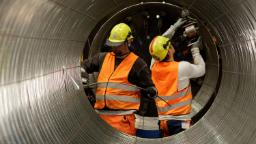
CNN
—
There are few energy projects in the world as controversial as the Nord Stream 2 pipeline, and on Tuesday, it all but died in the water as Germany’s leader halted its approval process over the Ukraine crisis.
The 1,230-kilometer pipeline was supposed to ferry huge amounts of natural gas directly from Russia to Europe via Germany, and although it has been sitting there, built for more than five months, not a single delivery has passed through it.
The project has divided politicians, analysts and Europeans for years, and has been beset by delays, previous US sanctions and opposition over its impact on the climate crisis.
German Chancellor Olaf Scholz’s announcement was the strongest concrete response yet from the West to Russia’s military action in eastern Ukraine.
But it puts Europe in an uncomfortable position — Russia could simply turn off its other gas taps that power most of the continent and leave millions of people in the dark and cold. Natural gas is the fuel that can power water heaters, furnaces, stoves and ovens.
Germany already receives Russian gas through Nord Stream 1, a similar pipeline that also runs under the Baltic Sea. But as Russia stepped up its military action in Ukraine overnight, the pressure on Germany to stop the project in its tracks dialed up.
Whether or not Germany officially scraps Nord Stream 2 in the long term, Russia’s actions in Ukraine make the project politically dead.
Fears that Russia would use Nord Stream 2 as a geopolitical weapon to push its interests — and expansionism — in Europe are now proving well-founded. But loading the weapon with actual gas will weaken Europe’s position even further.
The project was already running into political problems.
Germany’s new coalition government has a strong Greens presence that opposed the increased reliance on natural gas – a fossil fuel that is now contributing more greenhouse gas emissions in the EU than coal, so reliant it has become on what was supposed to be a fuel to transition to renewables.
Nord Stream 2 was set to add 100 million tons of carbon dioxide into the atmosphere every year, not to mention the inevitable leaks of methane, a greenhouse gas with more than 80 times the planet-warming power of CO2 in the short term.
Now Europe — Germany in particular — has an opportunity to use this moment to move away not just from Nord Stream 2 but its growing reliance on fossil gas altogether.
Germany is one of few developed nations that opposes nuclear power and is in the process of shutting down its few reactors. Without it, it has become highly dependent on gas, and will need a radical rethink to speed up energy generation from renewables.
Considering the environmental concerns around dealing with the radioactive waste that nuclear energy brings, its role in the future energy mix across Europe as a whole has its limitations. A rapid scale-up of renewables — solar, wind and hydropower — offer security in both energy and climate protection. Moving subsidies away from fossil fuels to renewables would be an easy first step.
In the short term, Europe can scramble gas from other countries – unlikely enough to replace Russia, but perhaps enough to get by – and deal with the immediate Russian threat.
But the forever problem of the climate crisis will keep churning and will ultimately be deadlier and costlier than military confrontation is likely to be.

